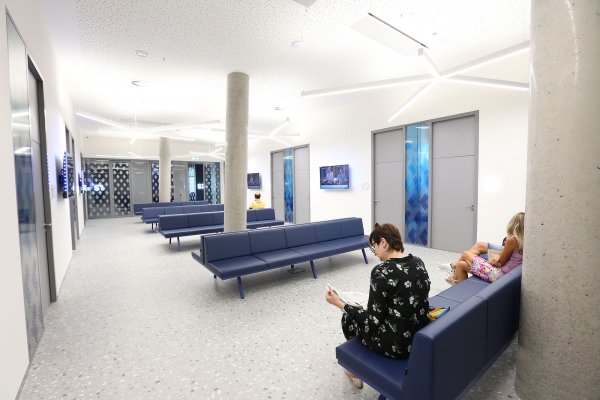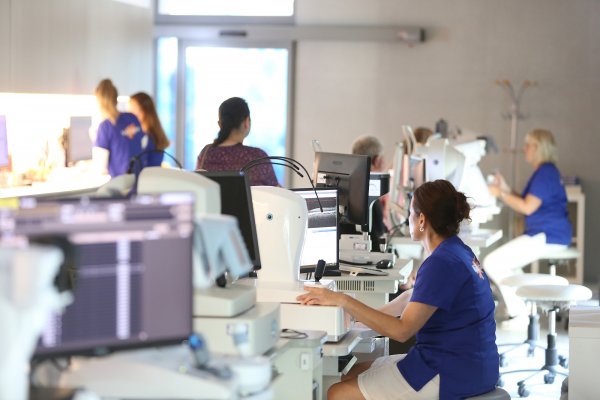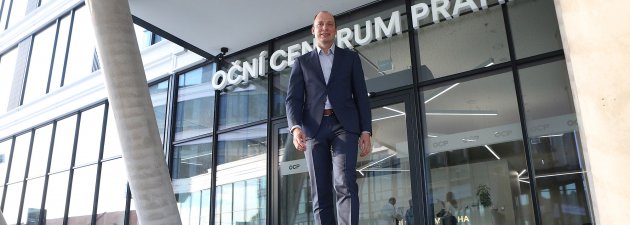"You will never cross the ocean if you are afraid of losing sight of the shore," Christopher Columbus said allegedly centuries ago, and we know what happened next. The world would not be moving forward without courageous people. Without enthusiasts who live their dreams and love what they do. Adam Janek, director of Eye Centre Prague (OCP), is one of these people. We talked with Mr. Janek in the newly built OCP clinic, a timeless industrial space of the Port7 building in Prague’s Holešovice district.
Just like Columbus's plans for new roads, your project for a new clinic may have seemed unrealistic at first. The first idea came during the covid pandemic, and when the construction works started, there was big energy uncertainty and rising inflation, so the initial budget went up considerably. Yet, despite all these obstacles, you did eventually open the new clinic in spring 2023, and now we are sitting here together. What has changed?
Pretty much everything actually. However, our main focus is still on Czech patients and our priority is to constantly improve the quality of care and increase its availability.
20,000 people: that's like a small town
Let’s talk numbers for a moment. How much have you grown?
The new premises are almost five times larger than the old ones. Today, on the area of almost 2,000 m2, we have spacious waiting rooms, examination rooms with state-of-the-art equipment, 12 specialist consulting offices and 4 high-tech operating theatres. We have our own pharmacy and optician’s. We have added 9 full-time employees to our team, which now has 52 members, 14 of which are our own full-time doctors. Our team is young, very professional, and most importantly, knows how to treat patients as partners. Plus it is compact and stable, which is not a common thing.
There is a shortage of doctors in the Czech Republic. How have you managed to build such a team?
That's one of the things I'm proud of. We founded our own educational academy in 2017. We offer residential graduate positions every year, and we have our own educational system, which consists both in theoretical knowledge, above all, in rich hands-on practice provided in our clinic as a comprehensive workplace. Our academy has already gained some reputation among doctors. They apply in big numbers, so we have a large pool to choose from.
When we spoke last year, your expectation for the new clinic was to increase the number of clients and surgeries by 30%. Has it worked?
It has exceeded our expectations, as the total capacity of examinations and surgeries of all types has increased by at least a third. I can already say that now we perform over 10,000 intraocular procedures every year. More than half of them are cataract surgeries and lens replacements, as well as intraocular applications of biological treatments. Another big part are retinal and vitreous surgeries, microinvasive cataract surgeries and laser refractive surgeries. We have 20,000 unique insureds and new ones keep on coming. We have thus achieved our goal to build one of the largest purely Czech eye clinics. I am happy about that, also because we have justified the trust of our shareholders. They have believed in me since the beginning and gave me a lot of autonomy, and I really appreciate that.

Spacious waiting rooms increase patient comfort
Foreign patients will find us
You were also looking to attract more foreign patients. How has this worked out?
We have performed successful surgeries on hundreds of patients from England and Ireland and dozens from Germany. Their number is growing, because the best testimonial is when they are happy and share their experience with others. Of course, we are a cheaper option for them, but they particularly appreciate our great service and human approach. Our staff have good language skills, so both our surgeons as well as nurses and receptionists can communicate with our foreign clients just fine. On top, Czech ophthalmology has an excellent reputation across the globe.
What does the great service mean in reality?
Every Sunday we receive around a dozen foreigners, so far mostly English people. Together with a specialist agency, we arrange flight tickets for them, welcome them at the airport, and take them to the hotel. On Monday, we take them to the clinic for examination, we order custom-made implants for them, and on Wednesday they undergo surgery. They pass the post-operative examination on Thursday or Friday and then they fly back home. But we keep in touch with them even afterwards. We want to know how they are doing.
Sometimes I get the question if we treat these foreign patients better than Czech patients. My answer is that we provide the same care to all patients. We treat them all in the same way regardless if the patient pays a hundred thousand for our services, or if it’s an elderly patient whose treatment is covered by the insurance company. This is how our clinic is set up.

Spacious examination room fitted with the most state-of-the-art equipment
We don’t neglect Czech patients. They are still our priority
Let's stick to Czech patients. What new things have you achieved in this respect?
As mentioned before, our priority is to increase the availability of care. That’s why we have been building a network of eye outpatient departments for the last two years. We call them Mediport, and they provide primary ophthalmological care at the same standard as OCP. So far, we have five such outpatient departments in Prague and Central Bohemia. They work just fine, and you will find specialist eye doctors, nice environment and modern equipment in all of them. All follow-up specialized examinations and surgical procedures, including biological treatment, are then performed in our clinic. I know this is the future because primary care is generally being neglected, and people will eventually end up with nowhere to go. We are looking to open two more Mediports soon, and my goal is to have a maximum of ten independent primary ophthalmology care workplaces.
The new clinic has changed pretty much everything. However, our main focus is still on Czech patients and our priority is to constantly improve the quality of care and increase its availability.
That's no small task. But you will surely have even more plans. Is there anything else you can reveal?
I think the future lies in interdisciplinary cooperation, specifically of GPs, diabetologists and ophthalmologists in screening for diabetic retinopathy. This very serious disease, which is linked to diabetes and can lead to blindness if left untreated, can be detected at an early stage.
Adam Janek was interviewed by Jana Jenšíková
Photo credits: Luděk Krušínský


